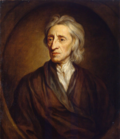Introduction
| Part of a series on |
| Libertarianism |
|---|
Libertarians advocate the expansion of individual autonomy and political self-determination, emphasizing the principles of equality before the law and the protection of civil rights, including the rights to freedom of association, freedom of speech, freedom of thought and freedom of choice. They generally support individual liberty and oppose authority, state power, warfare, militarism and nationalism, but some libertarians diverge on the scope and nature of their opposition to existing economic and political systems. (Full article...)
Selected article
Right-libertarianism (or right-wing libertarianism) refers to libertarian political philosophies that advocate negative rights, natural law and a major reversal of the modern welfare state. Right-libertarians strongly support private property rights and defend market distribution of natural resources and private property. This position is contrasted with that of some versions of left-libertarianism, which maintain that natural resources belong to everyone in an egalitarian manner, either unowned or owned collectively. Right-libertarianism includes anarcho-capitalism and laissez-faire, minarchist liberalism.
Selected quote
| “ | I remember the occasion when a fellow graduate student at Columbia from Sweden wanted to take me downtown to a restaurant for a Swedish meal and introduced me to the Swedish drink aquavit. This was a restaurant at which this Swedish fellow had been getting aquavit all during Prohibition; they had been selling it to him. And this was just after the repeal of Prohibition. We went there and he asked them for some aquavit. They said, "Oh, no, we haven't gotten our license yet." And finally, he talked to them in Swedish and persuaded them to take us into the back where they gave us a glass of aquavit apiece. Now that shows the absurdity of it.
Prohibition was repealed in 1933 when I was 21 years old, so was a teenager during most of Prohibition. Alcohol was readily available. Bootlegging was common. Any idea that alcohol prohibition was keeping people from drinking was absurd. There were speakeasies all over the place. But more than that. We had this spectacle of Al Capone, of the hijackings, of the gang wars... Anybody with two eyes could see that this was a bad deal, that you were doing more harm than good. In addition, I became an economist. And as an economist, I came to recognize the importance of markets and of free choice and of consumer sovereignty and came to discover the harm that was done when you interfered with them. The laws against drugs were passed in 1914, but there was no very great enforcement of it. |
” |
| — Milton Friedman (1912–2006) America's Drug Forum (1991) |
Selected picture
 |
General images
Selected biography -
Murray Bookchin (/ˈbʊktʃɪn/; January 14, 1921 – July 30, 2006) was an American social theorist, author, orator, historian, and political philosopher. Influenced by G. W. F. Hegel, Karl Marx, and Peter Kropotkin, he was a pioneer in the environmental movement. Bookchin formulated and developed the theory of social ecology and urban planning within anarchist, libertarian socialist, and ecological thought. He was the author of two dozen books covering topics in politics, philosophy, history, urban affairs, and social ecology. Among the most important were Our Synthetic Environment (1962), Post-Scarcity Anarchism (1971), The Ecology of Freedom (1982), and Urbanization Without Cities (1987). In the late 1990s, he became disenchanted with what he saw as an increasingly apolitical "lifestylism" of the contemporary anarchist movement, stopped referring to himself as an anarchist, and founded his own libertarian socialist ideology called "communalism", which seeks to reconcile and expand Marxist, syndicalist, and anarchist thought.
Bookchin was a prominent anti-capitalist, anti-fascist and advocate of social decentralization along ecological and democratic lines. His ideas have influenced social movements since the 1960s, including the New Left, the anti-nuclear movement, the anti-globalization movement, Occupy Wall Street, and the democratic confederalism of the Democratic Autonomous Administration of North and East Syria. He was a central figure in the American green movement. An autodidact who never attended college, he is considered an important left theorist of the twentieth century. (Full article...)
Related portals
Parent portals
Socio-political portals
Topics
Categories
Points of interest
| Points of interest related to Libertarianism on Wikipedia: History – Portal – Category – WikiProject – Alerts – Deletions – Assessment |
Associated Wikimedia
The following Wikimedia Foundation sister projects provide more on this subject:
-
Commons
Free media repository -
Wikibooks
Free textbooks and manuals -
Wikidata
Free knowledge base -
Wikinews
Free-content news -
Wikiquote
Collection of quotations -
Wikisource
Free-content library -
Wikiversity
Free learning tools -
Wiktionary
Dictionary and thesaurus
© MMXXIII Rich X Search. We shall prevail. All rights reserved. Rich X Search




































